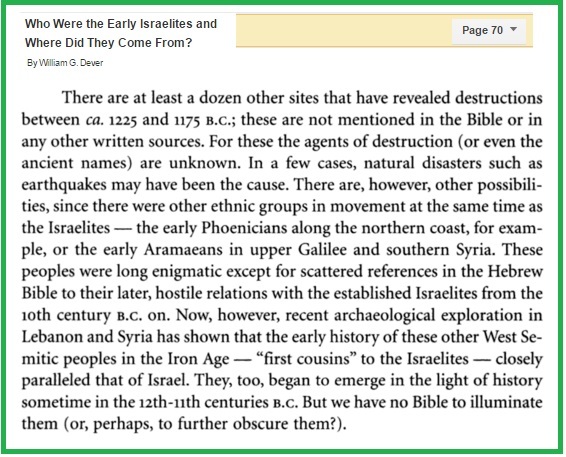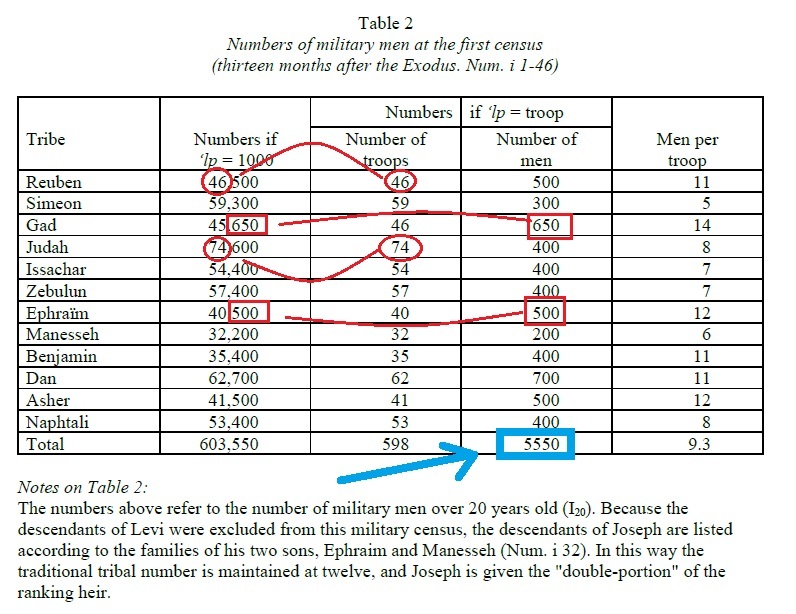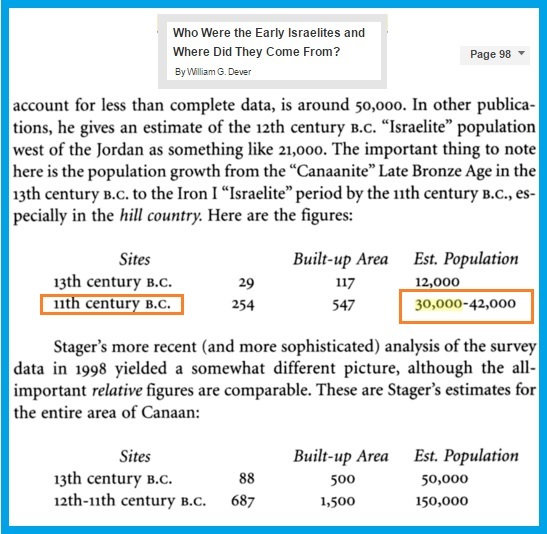This carries on from a previous discussion. On the topic of the historicity of the Exodus, I present these two short articles.
If we look at what the Hebrew “took away” with them from their centuries of Egypt, we don’t really find much:
-
The Egyptians had a huge interest in the afterlife - - whereas the post-Egyptian Hebrew don’t appear to have ANY thought about the afterlife.
-
The post-Egyptian Hebrew have virtually no further entanglements with Egypt until Solomon marries an Egyptian princess. This really wouldn’t be possible until AFTER the Philistines settle in the midst of the Levant.
-
And we haven’t even touched the topic that nobody has found a trace of 1 million Exodus refugees anywhere in the Bronze Age.
Given the teaching they received from Moses, that is hardly surprising.
Evidence please.
That’s because Israel didn’t number anywhere near one million at the time of the Exodus. This has been discussed extensively in the literature.
Jonathan… i’ve littered my discussion of evidence across three earlier threads now … how many NEW threads will you be creating?
If you haven’t read any of my earlier posts on the topic, I doubt if you will start reading them now…
As for the millions of Hebrew that did NOT exist at the time of Exodus … if we can’t believe in the numbers … why should we believe in the times?
I have read your previous posts. They’re nothing new. They’re typically posts on peripheral issues, which take a few facts combined with a few unsubstantiated assertions, and never actually address the evidence for a Hebrew presence in Egypt, nor the evidence for a Hebrew exodus, nor the evidence for a Hebrew entry into Canaan. There’s no point saying “The Hebrews couldn’t enter Canaan because Egypt” if you can’t present evidence that this was the case, and if you can’t address the evidence that they did enter Canaan despite Egypt.
We can believe the numbers. What’s important is not interpreting them wrongly. Interpreting them as a reference to millions of people, is interpreting them wrongly.
Okay… let’s interpret the word for THOUSAND as “tents” or “families” … instead of over 1000 thousand’s we only have 1000 tents. And that a “tent” represents some 4 or 5 people (numbers vary) … so Exodus ends up being a movement of some 4,000 or 5,000 people. That’s MUCH more reasonable, right?
But part of the story line of Exodus was the HUGE population they represented:
Exo 1:8-9
“Now there arose up a new king over Egypt, which knew not Joseph. And he said unto his people, Behold, the people of the children of Israel are more and mightier than we…”
6,000 nomads would NOT be more and mightier than Egypt.
As for the MULTIPLE archaeological papers and analysis that you sweep aside in one sentence… please pick one. Or will you be moving the discussion to yet ANOTHER new thread to avoid the issues yet again?
It’s more likely to be in the order of 20-30,000. We have archaeological evidence for a population around this number inflating the population of Canaan.
The standing army of Egypt at the time couldn’t field more than around 20,000 men (and that’s being generous). Even when it fielded its largest army on record, at the Battle of Qadesh, it didn’t have more than 25,000 soldiers. A group of 6,000 nomads would have been a threat. A group of 20-300,000 nomads, already inside Egyptian borders, would have been a significant danger.
But the text doesn’t even present the Egyptians as being concerned about a set battle with the Hebrews.The text represents the Egyptians being concerned about a fifth column within Egyptian borders, which could completely destabilize them if an enemy such as the Hittites invaded. The text is very specific, “if war breaks out, they join our enemies and fight against us and escape from the land”. That’s a realistic threat even if the Israelites could only field 6,000 men at arms.
I haven’t swept them aside. I have shown you the scholarly consensus and the archaeological data on which it is based. The scholarly consensus not that the Exodus was impossible due to the rulership of Egypt over Canaan.
Ahhh… so … specifics… 20k to 30k ??? I’ve never actually read that particular estimate.
What is the word that you are translating differently? And what is the REVISED translation that gets you into the 25,000 head count?
For the dramatic population increase in Canaan, see William Dever, “Who Were the Early Israelites and Where Did They Come From?” (2003). On page 98 he shows the population of LBA Canaan grew from around 12,000 in the thirteenth century BCE, to 30-40,000 in the eleventh century.
See Colin Humphrey’s paper. It’s well discussed in the literature.
Jonathan, you are using the 30k number because that is the estimated size of the entire Canaanite population?
What does that have to do with interpreting the Bible Hebrew about the population of the Hebrew workers in Egypt? If you think Humphrey’s paper will answer this question, you can wait until I read it. I’m eager to look at that.
But if you know Humphrey’s paper isn’t going to clarify my specific question above, you can go ahead and respond to that when you get a chance.
After the exodus, while Moses was in the desert, he numbered the fighting men. We see that numbers could vary widely between tribes. We also know that numbers were at times greatly reduced. 3000 men were slain at Mt. Sinai alone after they built the golden calf. Plagues, disease, battles, etc. also destroyed many people before and while they were in the desert. (eg. 14,700 died of a plague- Numbers 16). (and another plague Numbers 25 - 24,000 died)
Fighting men were numbered… Numbers 26… 20 years and older. 43,000 +22,000 + 40,000 + 76,000 + 64,000 + 60,000 + 52,000 + 32,000 + 45,000 + 64,000 + 53,000 + 45,000 = (approx.) 601,000. Plus the Levites. So we would expect nearly 2 million Israelites at this time, but perhaps many died before entering Canaan. In fact, all those died who were 20 years and older when they came from Egypt. On the other hand, they had 40 years in the desert to increase their population as well, with the new generation of children. But presumably it was a much younger population, with the oldest being near 60 yrs, and none except Joshua and Caleb older than that, compared to Aaron and Moses dying at well over a hundred years of age.
Okay… it was good to see Colin Humphrey’s paper. Certainly much of it brings familiar material back into mind.
Probably the most convincing option is the one described (out of several) early in the paper:
“The Hebrew word translated “thousand” (Hebrew 'lp ) has been mistranslated and should have been
translated as “family”, “group”, or “troop”. Thus Flinders Petrie [6] suggested that when the
number of the tribe of Reuben is translated as forty-six thousand five hundred (Num. 1:21), the
correct translation should be 46 families containing 500 men. Mendenhall [7] agreed with Petrie,
except that he argued that the lists refer to men of military age, not the whole population.”
Clark [8] and Wenham [9] have proposed variations of the Petrie theory. Israel’s total population
leaving at the Exodus was 5,550 according to Petrie, over 20,000 according to Mendenhall,
about 72,000 (Wenham) and about 140,000 (Clark)."
As you can see, it follows the lines of my earlier posting, where I offered the possibility that the word for “thousands” should be interpreted as “tents” or “family”.
"The consonants 'lp have a number of different meanings in Hebrew including the following:
(i) 'lp (later vocalised as 'elep) means “a thousand”. It has this meaning in Gen. xx 16, Num. iii 50, etc.
(ii) 'lp (later vocalised as 'allup) means “leader” (chief, etc.). It has this meaning in Gen. xxxvi 15, Ps. 1 v 13, etc.
(iii) 'lp (later vocalised as 'elep as in (i)) means “group” (family, clan, etc). It has this meaning in Judg. vi 15, I Sam. x 19, etc. Brown, Driver and Briggs13 suggest that this third meaning of 'lp is in the sense of a company of men united under a leader, which shows an interconnection between the various meanings of 'lp. Following others (e.g. Noth)14, if the group of men involved is a military unit we will refer to it as a “troop”."
FOOTNOTES:
[6] W.M. Flinders Petrie, Researches in Sinai (John Murray, 1906), pp. 207ff.
[7] G.E. Mendenhall, “The census of Numbers 1 and 26”, JBL 77 (1958), pp. 52-66.
[8] R.E.D. Clark, “The Large Numbers of the Old Testament”, Journal of the Transactions of the Victoria Institute 87
(1955), pp. 82-92.
[9] J.W. Wenham, “Large numbers in the old Testament", TB 18 (1967), pp. 19-53.
As you can see, Jonathan, my estimate is in line with Petrie’s 5,500.
If you are going to go out of your way to say a word in the Bible is poorly translated, I don’t see much point in combining that decision with a number that is STILL inconsistent with historicity or plausibility. You estimate 30k? How? And how would 30,000 have survived at Kadesh Barnea for a generation? It’s all pretty FABULOUS…
Whereas the table constructed by the author seems fairly sober … where the first part of a ridiculously large number is a reference to the number of troops, and the 2nd part of the ridiculously large number is the combined number of men.
NEXT TOPIC: Are you saying that you think Moses, one of the glowing figures in the Gospel account of the Transfiguration (!!), opposed teaching the Hebrew about an afterlife? If he did … wouldn’t that have come up? If he supported a notion of the afterlife, wouldn’t THAT have come up?
Exodus is without any discussion of an Afterlife because the Hebrew had no real contact with the Egyptians, and the Hebrew (like the Canaanites of the day) did not have a theology of an afterlife.
Now you will have to explain all the other numbers, in a similar fashion?
The three thousand who died of plague were 3 families and no one died?
The 14,700 who died were 14 families with 700 dying (20 per family/troop)?
The 24,000 who died were 24 families/troops with none actually dying?
Perhaps a different hebrew term was used?
I am not tied to the number 30,000. I have made it clear I am happy with Humphrey’s estimate, which no doubt has a margin of error. The archaeological data cited by Dever makes it clear that the population of Canaan at this time increased by between 20,000 and 30,000 people, virtually all of whom must have come from outside the land. Even if we reduce this number by assuming some of it is attributable to natural population growth, we still end up with most of them entering from outside. This agrees with Humphrey’s estimate extremely well.
Yes I see that. But your estimate does not agree with the archaeological data; it’s far too small a number. When theories disagree with facts, theories must give way.
I don’t see how it’s inconsistent with historicity or plausibility. On the contrary, the simple fact is we have a population increase of between 20,000 and 30,000 people in Canaan at this time. Whatever your interpretation of the Bible, it has to agree with the established facts.
I am saying he didn’t teach them about an afterlife. If he had supported a notion of the afterlife that would definitely have come up. It doesn’t.
Ok well that’s an interesting theory, but without evidence it remains a theory.
I suggest you read Humphrey’s paper, if you haven’t already. Any interpretation of the numbers which seeks to honest to both Scripture and facts, must start with the archaeological data and with the fact that God Himself told Israel they were “the least numerous of all peoples”, and that the land they were entering was occupied by nations with larger populations than them.
Deuteronomy 7:
1 When the Lord your God brings you to the land that you are going to occupy and forces out many nations before you – Hittites, Girgashites, Amorites, Canaanites, Perizzites, Hivites, and Jebusites, seven nations more numerous and powerful than you –
7 It is not because you were more numerous than all the other peoples that the LORD favored and chose you–for in fact you were the least numerous of all peoples.
It is not easy to read these passages of Scripture and conclude that they are saying Israel’s population was around two million.
John,
The one thing you are probably not prepared to accept is that what two different setions that look like they are involve the same type of linguistic approach does not necessarily mean the same linguistic approach is being used.
Ezra and Nehemia are full of contradictory information … the problem is not resolved by rigidly applying linguistic rules to texts which appear to diverge in all sorts of ways.
So I was reading from Dever … especially the page you suggested:
Again, Jon, we are confronted by what is REAL history … the arrival of the Sea People in the Levant.
At 4,000 immigrants per Philistine settlement of the Pentapolis, we are already at 20,000 people… but there was no doubt a much more general increase in population throughout the region.
As they arrived, there would be Canaanite refugees receding up into the Hill Country…
Ironic, isn’t it? The very time Palestine’s population influx is MOST understood… is the influx that you want to claim for the Hebrew coming out of Egypt…
I think that is mostly wishful thinking…
Where is this coming from? Do you understand why Dever doesn’t attribute this population increase to Philistine arrivals?
It’s not wishful thinking to propose that the population increase here was due to the Hebrews. That is what Dever himself proposes, even though he believes most of the Hebrews originated from Canaan. If you think Dever isn’t doing real history then I suggest you write and tell him so.
Isn’t it true that Dever, armed with all this evidence, does not generally support the “Out of Egypt” Exodus scenario …
On the page I pasted below, we can see that Dever looks at LOTS of different sources of these immigrant movements…
I’m a little surprised you are trying so hard to make Dever prove an Exodus that he doesn’t actually support:


